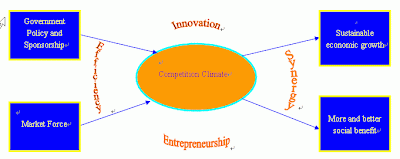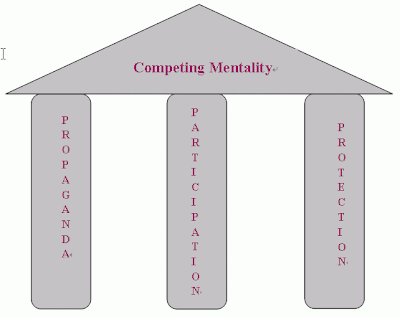How to get the Europe back to the right track and achieve the goal set by Lisbon Strategy which aims to turn EU into the most competitive and dynamic knowledge based economy in the world? The answer lies on the creation of a unitary competition climate by each individual Europe country and the competing mentality held by most European people.
Upfront Challenge
Economic activity slows down in the Europe area, the employment rate is sagging and the business environment is getting worse steadily. In addition, each country holds different priority and political agendas, consequently the breach of multilateral agreements and pacts is stepping up, which leads to the intense friction between countries.
Europe also falls consistently behind the U.S.A. with approximate 2% lag over a long period time. Globalization brings competitive pressures not only on labor intensive industrial sectors but also on high-value and high-tech sectors. Moreover, the ageing European population also poses potential risk that would cripple the social security systems.
It is an urgency to inject the necessary dynamism and inspiration into Europe and its people in order to make European industry more competitive vis-à-vis its major global competitors.
Create benign competition climate
The benign competition climate is the set of factors spurring efficiency, stimulating innovation, spawning entrepreneurship and building synergy. Market force and government policies and sponsorship are two inputs that shape the benign competition climate.
Under current situation in the Europe, there is one illusion that treats the globalization and competition as the specters threatening European societies. However, regressing to heavy-handed state intervention and protectionism in order to fend off global competition would doom to be a failure. In the contrast, globalization is a win-win game instead of a win-lose game. An open and competitive market within a globalizing economy is able to deliver growth in one part of the world and simultaneously creates a wave of opportunities elsewhere too. Defensive action” – protectionism – would cut Europe off from the global market place it needs to engage to ensure economic growth and the sustainability of social models. To reach a high level of competitiveness Europe is required not only to focus on global competition, but also on competition inside the European Union and at national level. A competitive market will surely boost efficiency, encourage innovation, ensure long-term growth and raise the standards of living for everyone. Competition also makes companies strong and adaptable. So competition at home makes sure that businesses will also be able to successfully compete abroad.
Although it is widely accepted by the economists that markets are usually much better at allocating economic resources than government, orderly market conditions can not be established automatically. This is why smart government policies and sponsorship are crucial to make sure that the competition in the market place cranks out the expected outcome.
First of all, the policy should be competition-oriented. Government will support business entities that are willing to participate the competition regionally and internationally rather than provide solo economic shield that would only encroach on the efficiency and push up the price.
Second, the policy should aim at creating an atmosphere that promotes entrepreneurship in terms of financial aid, legal support and tax relief or exemption. As a very active element in the market, entrepreneurship makes great contribution to form a competition climate, drive economic growth and create quality jobs.
Third, government’ sponsorship should target on what is needed to revive Europe’s competitive edge. For example, government should grant financial back-up to company’s R&D activities in order to boost innovation.
Last but not the least important, European countries should build synergy that can leverage the whole Europe’s competition capability. To reap the maximum benefit from this end, a unitary competition policy aiming at enhancing the European’s competency should be adopted and honored by every European country. When the synergy is gained, the full potential of Europe will be unlocked and Europe will become much stronger in the global market. This conclusion can be further proved by a recent OECD study (Title: “The Benefits of Liberalising Product Markets”[1]), which suggests that aligning the different European national economic policies with the most competition friendly regimes would result in huge benefits for the European economy overall: a 2 to 3,5 % growth in GDP per capita.
Nevertheless, this is quite a challenging task for all the Europe countries. Although EU has achieved single currency and single market, the diversity of the member countries is still large. Not mention the other countries out of EU, which are still far behind the EU countries. The divergence inevitably creates the parochialism. It is tempting for individual country to deviate from a collective agreement with the purpose of addressing domestic political and economical agendas. However, this kind of economic patriotism twist the market force’s efficiency to allocates economic resource. In the short run, some industries might fend off the competition by the inappropriate government subsidization, but in the long run, these industries will become vulnerable or even terminated when the external competition force overtake the protection of the government.
If the competition climate could be established correctly, it would become the corner stone to elevate efficiency, stimulate entrepreneurship and encourage companies to innovate. The benign competition climate will incubate two desired outputs, the sustainable economic development and the better social benefit for every European citizen.

Competing Mentality.
Europe is facing great challenge internally and externally. If competition is the weapon to battle with this challenge, the people who will fight this war must be trained to use this weapon artfully.
Mentality is the attitude of mind or the way of thinking. Government policies and market force can create the hardware of the competition climate. But without the competing mentality to follow, the system will go nowhere without the right mentality working as the software. Especially under current circumstance, globalization and competition are not popular in European’s dictionary. Re-shaping people’s perception toward competition is also an indispensable step to form the benign competition climate.
To shape competing mentality, three pillars must be planted. The three pillars are Propaganda, Participation and Protection.

Propaganda
Mentality is a mindset, it can not be taught, but can be motivated. A thorough propaganda to extol the competing mentality should be launched across the Europe continent in order to increase people’s awareness to the sustainable benefit driven by the competition at the local level and global level. The idea must be made crystal clear, the benefits of competitiveness, growth and lasting social and environmental development are mutually reinforcing rather than unilaterally debilitating under a global competition context. The exposure also need extend to the next generation, from the child to the youth, they are the future of Europe and they should know what is ahead of them and what they should prepare for.
Participation.
Both top-down and bottom-up methodology should be applied to build a competing mentality. Through top-down, all the European government, European Commission, local administrations and other public organizations need to permeate the concept of competition in their polices, regulations and statute. All the administrators should be proactively engaged in the promotion for the competition. EU plays an extremely role in this process because it represents the most influential parts of the Europe and it is the light house that guides the route of all European countries. It also has its authoritative and political power to make things happen.
Through bottom-up, the engagement of all the European citizens and private sectors is pivotal too. What they demand, concern and support determines whether this dynamic change can be successful. Their voice must be heard and heard clearly. If and only if their participation became active, the adversity occurring along the way of moving forward could be understood and accepted because the people who play the game also make the game rules.
Protection
Protection seems to be on the opposite side of competition. Whereas here the protection is at the social dimension rather than at the economic dimension. Out of the question, competition will bring long-run benefit to the whole Europe. But we have to keep in mind that those benefits will not be evenly distributed across the society. Competition do make winner and losers. The bankruptcy, unemployment and even poverty will still exist for a long period of time under the competitive business environment. They are the prices that have to pay and they will level off when the benign competition climate fully forms and functions. However, the solace offered by government and other institutions is still critical to maintain the social security and stability which are essential to maintain a friendly business environment. Besides, the protection also shoulders another very important responsibility of re-training the European workforce so they can fit in a knowledge-based economy and become more competitive. As a matter of fact, this would be the utmost protection for the European people.
Conclusion
Europe has prodigious potential. The enlargement of EU continues and the integration of the Europe accelerates. The 500 million people are invaluable assets, holding world-class skills and innovation capabilities. But Europe has not achieved the supernova performance commensurate with its abilities not only because of the ailing economic framework but also due to the low spirit and tumbling confidence. To unleash Europe’s enormous potential and rejuvenate its glory, a competition strategy and a dose of inspiration are necessary. In 14th century, Europe germinated the renaissance that brought immense impact on civilization and human history. In 21th century, I believe that a united Europe and its inspirational people will thrive again on the crest of the globalization wave and become the role model for the rest of the world. An inspired Europe will also inspire the world.
No comments:
Post a Comment